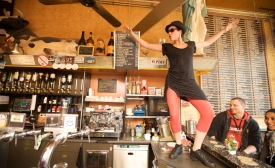australia
THERE ARE SOME rather remarkable aspects of the increasingly heated debate about China’s influence in Australia. First, the idea that China actually has any “soft power” to exert is actually rather surprising. Soft power, after all, is something that has generally been associated with our cousins in the U.S. — not “Communist China”.
The WA government has honoured the heroic actions of a Perth doctor by donating an ultrasound machine to his home country of Ghana. "This is a demonstration of the generosity of the people of Western Australia, and particularly the hospital, towards the people of Ghana. A machine like this is going to help address some of the health concerns we have," she said.
[T]the Pacific Islands Forum's leaders' summit brings together members for political discussions on deeper regional cooperation and integration. And while China has been making friends in the Pacific, Australia has been making enemies.
China's Mid-Autumn Festival will fall on September 15th this year. Chinese people mark the festival by getting together with their families and eating mooncakes. Even if you're not in China, you can still get a taste of the festive atmosphere. We'll take you now to a special performance in Australia and a mooncake-making contest in Cape Town, South Africa.
Revelations that Labor senator Sam Dastyari benefited from the largesse of Chinese benefactors have prompted several Australian journalists to draw attention to the problematic prospect of Chinese influence in Australia. [...] While important stories, these are not examples of soft power. Soft power is something different and the difference is important. Understanding it helps us analyse China’s attempts at influence.

The Short+Sweet Theatre Festival shows what citizen diplomacy can achieve.
The recent commercial backing of Australia Plus by three foundation partners is a boon for Australia’s soft power and demonstrates the resilience and innovation of the Australian Broadcasting Corporation. Beyond this, it should be seen as an opportunity for Australian businesses and a case study in corporate entrepreneurship.
A clear majority of Australians (72 percent) said they would like to learn more about Indonesian culture — a strong finding for champions of cultural diplomacy. When the discussions turned to education, the alignment was unmistakable: 57 percent of Indonesians said they would like to learn more about Australia and a similar number (59 percent) agreed basic education about Australia should be improved in Indonesian schools.







